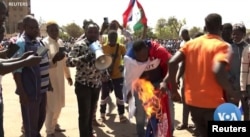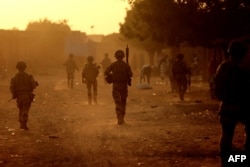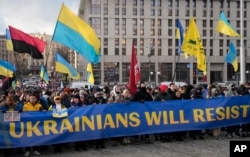On January 25, France’s Foreign Ministry confirmed that French troops will be withdrawn from Burkina Faso at the request of the West African country’s junta-controlled government.
France has maintained a 400-strong special forces presence in Burkina Faso under a 2018 defense accord to help battle Muslim extremists linked to al-Qaida and Islamic State.
Relations between France and Burkina Faso – formerly a French colony – have been on the skids since September 2022, when Burkina Faso experienced its second coup that year (the first was the prior January).
French President Emmanuel Macron, who has called Russia’s ambitions in Africa “predatory,” reportedly accused Russia of influencing Burkina Faso’s decision to demand a French troop withdrawal.
Russian Foreign Minister Sergey Lavrov denied that claim.
“This is a question about the principles of foreign policy,” he said. “We do not interfere in the internal affairs [of other countries], while President Macron's statement clearly indicates that France regards such interference as possible and resorts to it.”
But while the exact nature of all Moscow’s actions in Africa remain murky, Russia’s interference in the “internal affairs” of other countries is well-documented.
In December, Ghana’s President Nana Akufo-Addo claimed Burkina Faso had cut a deal with the Russian private military company known as the Wagner Group. Akufo-Addo said Burkina Faso, in exchange for helping to combat jihadists, had ceded to Russian forces control of a mine that reportedly has gold reserves.
Akufo-Addo said having the Wagner Group “operating on our northern border is particularly distressing for us in Ghana.”
Neither the Wagner Group nor Burkina Faso authorities have confirmed a deal has been struck between the two sides.
The Wagner Group has been accused in news reports of plundering gold and diamonds in Sudan, in part, to fund Russia’s war effort in Ukraine, in exchange for protecting Sudan’s unpopular military leader.
Wagner Group founder Yevgeny Prigozhin expressed support for both 2022 coups in Burkina Faso.
In January 2022, Paul-Henri Damiba ousted Burkina Faso’s democratically-elected president. Prigozhin hailed the coup as “a new epoch of decolonization” in a social media post.
A day after that coup, Alexander Ivanov, the official representative of Russian military trainers in the Central African Republic (CAR), issued a statement offering training to Burkina Faso’s newly installed junta.
But after Damiba was ousted in September, observers noted he had not immediately pivoted from France to Russia, as expected.
When military officers, including current military leader Ibrahim Traore, overthrew Damiba, civilians and soldiers took to the streets with Russian flags, particularly outside the French embassy.
Sergei Markov, a former Kremlin adviser, said of the September ouster: "Our people helped the new leader [of Burkina Faso].”
Voice of America’s Henry Wilkins reported that Russian disinformation had “played a part in the country's second coup in eight months.”
That includes Kremlin-linked accounts being used to “animate the discourse across the region,” The Washington Post reported.
In one animated video posted to social media, Wagner Group mercenaries are showing fighting French forces in Burkino Faso and Mali. The French forces are depicted as snakes and zombies.
The Atlantic Council’s Digital Forensic Research Lab revealed “an uptick in pro-Russian messaging” before both the January and September 2022 coups.
The language used in those pro-Russian posts tracked with rhetoric employed by Lavrov and Prigozhin, stressing the “anti-colonial” nature of the shift away from France and toward Russia.
With Traore taking the helm, the French exit, and Russian entrance, appear to be going forward.
“The recent coup could be a gateway to a more assertive Russian policy towards the Sahel,” Samuel Ramani, an associate fellow at the Royal United Services Institute, a British defense and security think tank, told VOA in October.
“The Burkina Faso coup that we just witnessed could be the first example of Russia playing a part in instigating a coup rather than just capitalizing on pre-existing unrest," Ramani said.
If so, it fits within a regional pattern.
The announced French troop withdrawal from Burkina Faso comes just months after France pulled troops from neighboring Mali, where they were also conducting counter-insurgency actions.
Mali’s government likewise turned to the Wagner Group (with the support of Russia’s armed forces) to help it battle jihadists.
Reports have also surfaced that Moscow trained the military officers behind an August 2020 coup d’etat in Mali, prompting speculation the Kremlin may have played a role in that putsch.
Wagner forces in Africa are being used to spread Russian influence and “coup-proof” regimes “in exchange for financial and mineral concessions,” concluded analysts at the Center for Strategic and International Studies (CSIS) think tank in Washington, D.C.
As Polygraph.info previously reported, the introduction of Wagner Group forces has been accompanied by an uptick in alleged crimes against humanity.
Elsewhere in the world, Russia occupies the territory of three neighbors — Georgia, Moldova and Ukraine. Russia is waging war against Ukraine, and it previously invaded Georgia.
In July, Lavrov explicitly stated that Russia would help Ukraine get rid of its government, against the will of the Ukrainian people.
Russian military intelligence was linked to a recent letter bombing campaign in Spain and an alleged 2016 coup attempt in Montenegro. It has also carried out multiple assassinations on foreign soil, as part of what the watchdog group Freedom House called Russia’s “transnational repression efforts.”
A U.S. intelligence review found Moscow has secretly funded individuals and officials in more than two dozen countries since 2014 to advance the Kremlin’s interests and influence election outcomes.
There is also Russia's interference in the 2016 and 2020 U.S. elections.
All of those actions constitute interference in the internal affairs of other countries.








